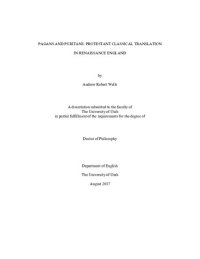
Ebook: Pagans and Puritans: Protestant Classical Translation in Renaissance England
Author: Andrew Robert Wells
- Year: 2017
- Publisher: The University of Utah
- Language: English
- pdf
Classical translations by devout English Protestants represent a valuable nexus for interpreting the effects of humanism and the Reformation in England. The Protestant reformers forced Europeans to reimagine their connection to the pagan past. Protestant translators with humanist training felt pressure to make their classical texts and authors useful for their readers’ religious and moral lives, writing paratextual materials and departing from a literal rendering of the source text in order to create an imagined relationship with the past.
In my introduction I contrast Tertullian’s rejection of and Augustine’s accommodation of pagan material as echoed by humanists and reformers with renewed urgency throughout the sixteenth and seventeenth centuries.
Chapter 1 places Golding’s 1567 text in its religious context, arguing that Golding risked censure from his fellow Puritans by bringing Ovid’s epic into English. Golding avoided criticism by offering an allegorical reading of the poem through his prefatory materials, but was careful to show that Ovid had meant his poem to be read allegorically.
In Chapter 2 I examine the competing secular, religious, medieval, and early modern theories of translation that factor into Drant’s 1566 book, A medicinable moral, which juxtaposes his verse translations of Horace's Satires and the book of Lamentations. I argue that Drant’s text mixes medieval and early modern rhetorics and practices of translation in his version of the Satires, but uses a different set of strategies when rendering the Bible.
Chapter 3 explores Hutchinson’s adversarial relationship with her source text and its author. I argue that Hutchinson’s preface to and translation of De rerum natura paint Lucretius as an enemy against whom she defines herself and proves her valor as a Christian author. However, Hutchinson approvingly echoes Lucretius’ description of the divine nature in Order and Disorder to defend a Calvinist conception of God.
In my conclusion, I argue that the Roman source-text authors were also translators who navigated some of the same waters as their Renaissance counterparts. I end by turning to Shakespeare’s Titus Andronicus for a kind of metafictional commentary on the stakes of humanist and Protestant translation in Renaissance England.
In my introduction I contrast Tertullian’s rejection of and Augustine’s accommodation of pagan material as echoed by humanists and reformers with renewed urgency throughout the sixteenth and seventeenth centuries.
Chapter 1 places Golding’s 1567 text in its religious context, arguing that Golding risked censure from his fellow Puritans by bringing Ovid’s epic into English. Golding avoided criticism by offering an allegorical reading of the poem through his prefatory materials, but was careful to show that Ovid had meant his poem to be read allegorically.
In Chapter 2 I examine the competing secular, religious, medieval, and early modern theories of translation that factor into Drant’s 1566 book, A medicinable moral, which juxtaposes his verse translations of Horace's Satires and the book of Lamentations. I argue that Drant’s text mixes medieval and early modern rhetorics and practices of translation in his version of the Satires, but uses a different set of strategies when rendering the Bible.
Chapter 3 explores Hutchinson’s adversarial relationship with her source text and its author. I argue that Hutchinson’s preface to and translation of De rerum natura paint Lucretius as an enemy against whom she defines herself and proves her valor as a Christian author. However, Hutchinson approvingly echoes Lucretius’ description of the divine nature in Order and Disorder to defend a Calvinist conception of God.
In my conclusion, I argue that the Roman source-text authors were also translators who navigated some of the same waters as their Renaissance counterparts. I end by turning to Shakespeare’s Titus Andronicus for a kind of metafictional commentary on the stakes of humanist and Protestant translation in Renaissance England.
Download the book Pagans and Puritans: Protestant Classical Translation in Renaissance England for free or read online
Continue reading on any device:

Last viewed books
Related books
{related-news}
Comments (0)